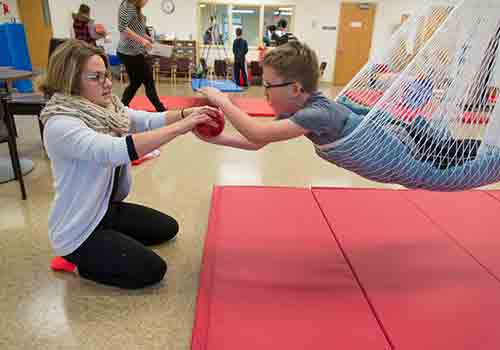Why Choose Nazareth for Occupational Therapy?
Occupational therapists have the privilege of working with individuals with impairments or disabilities to develop or regain the “occupations” that are meaningful in their lives. Occupational therapists may help people improve performance of daily living tasks, learn in school, engage in social relationships and community activities, or resume job duties impacted by illness or injury.
As a student in Nazareth's occupational therapy degree program, you learn how to develop or improve a person’s sensory, physical, cognitive/perceptual, and/or psychosocial abilities. You learn to modify the environment to help the person to be as self-sufficient and productive as possible. The program prepares you for entry-level general practice and develops your initial skills in areas of specialization such as early intervention, school-based practice, neurological rehabilitation, environmental analysis and modification, ergonomics, and treatment of upper extremity and orthopedic impairments.
Outcomes: Nazareth occupational therapy students consistently have 100% graduation rates and high pass rates on the National Board for Certification in Occupational Therapy (NBCOT) certification exam.
Is a doctorate required? No. The American Occupational Therapy Association (AOTA), which oversees occupational therapy education, determined with the Accreditation Council of Occupational Therapy Education (ACOTE) that people can enter the field as an occupational therapist with either a master's degree or a doctoral degree. If AOTA ever decides to mandate doctoral degrees for entry, all OTs with their master's degree will be grandfathered in and will not require additional education.
Program Highlights
- The curriculum offers you a wide range of interprofessional academic and clinical experiences, including an on-campus OT clinic, clinical outreach activities, and fieldwork opportunities.
- All occupational therapy majors take a gross anatomy course that includes dissection of a cadaver.
- Five rigorous practice courses in the senior year provide opportunities for hands-on clinical experience evaluating, planning and implementing and documenting interventions. Unlike other colleges, you'll do ongoing work with the same clients for 7-10 weeks.
- You will have the opportunity to engage in collaborative research with faculty and OT clinicians.
- You can prepare to work with young children and their families in early intervention and preschool by choosing the Developing Child and Families minor.
- You have the option to get specialized preparation in working with school-age children with autism through Nazareth's Interdisciplinary Specialty Program in Autism (I-SPAN) specialization.
- You have the option to include an early-intervention interprofessional concentration (track): Rochester Scholars for Early Intervention helps you develop specialty knowledge and skills to be a strong advocate for young children and their families.
- Most courses are offered in person, with interaction with professors and peers. The courses offered online (OTR 516, OTR 518, OTR 501, OTR 551 and a summer online option for OTR 101 and 102) also include in-person sessions for a portion of the course. You need access to a device with an internet connection; Nazareth students can use computers in Nazareth's library and computer labs.
Admissions standards for occupational therapy »
Become a Changemaker
- You will learn to take action and help people engage in what makes life meaningful to them.
- You will learn to persevere by addressing change through skill development and environmental modifications. Example: All OT students complete a certification program focused on learning how to assess the physical and social inclusion of all people at local recreation facilities. You then complete a community assessment and work with Rochester Accessible Adventures to make meaningful suggestions for change.
- You learn how to take a holistic approach with clients — such as working with faculty and OTs at Rochester Psychiatric Center to create and implement group activities to address psychosocial challenges.
- You will learn and have experiences that will help you engage in interprofessional practice in various health care settings, such as through medical case simulation with other health and human service students.
- You will learn to advocate, especially for underserved populations, including through meetings with New York state congressional members along with faculty to promote legislative changes that support health and wellness for underserved and marginalized populations.
Program Details
Options, Requirements, and Course Descriptions

Alumni Spotlight
“The strengths of the OT program include building close relationships with OT professors over five years and gaining more hands-on experience than is required by the profession. We do three week-long, and two 3-month fieldwork placements, which allow us to participate in providing OT in schools, long-term care facilities, hospitals, home care, and rehab centers. Each OT 'practice' course is connected to a clinical experience working with clients on campus and off-site. As a student OT, I’ve had so many opportunities to build a network.” — Morgan Monahan ‘17G, shown in the campus clinic helping a child build muscle tone, improve posture, encourage attention, and develop his skills using both hands.
Examples of OT Employers
- Elementary and high schools
- Schools for children with special needs
- Hospitals, clinics, and medical groups
- Home care agencies
- Medical equipment companies
- OT schools and research laboratories
- Long-term care settings
- Private practice
Internships/Field Experiences
- Rochester Psychiatric Center
- Heritage Christian Services
- Jewish Senior Life
- Strong Memorial Hospital
- ARC of Monroe
- Canandaigua VA Medical Center
- CP Rochester
- Mary Cariola Children’s Center
- Rush-Henrietta School District
- Greece School District
- E. John Gavras Center
Employment
Occupational therapy jobs are expected to grow 17.9% (adding 23,700 jobs nationwide) in the decade ending 2028, much faster than average, according to The Bureau of Labor Statistics. U.S. News & World Report in 2017 ranks occupational therapists among the top 20 health care jobs and #28 overall among The 100 Best Jobs.